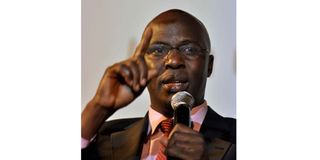Ken Walibora’s ‘Mbaya Wetu’ reveals why we vote in crooks

Ken Walibora, author of several well known Kiswahili books. He died on April 10, 2020.
What you need to know:
- In the play, the main character, named Matari, is a notorious thief and drunkard.
- However, society encourages his habit because some people are benefitting from his loot.
If Kenyan politics were a patient with mental disorder, he would be one capable of bewildering changes of mood, veering erratically, lurching between confidence and despair — with a proclivity for the macabre, the grotesque, the bizarre and the pathological.
The election campaigns have now taken a darker, dirtier and more divisive turn, and the country is teeming with politicians full of sullen rage, nihilism, cynicism, and scurrilous tactics.
As the politics of grievance heats up in the run-up to the general elections, and as politicians try to manipulate different communities against each other, one of the most relevant books is Prof. Ken Walibora’s play, Mbaya Wetu (loosely translated as “Our Crook”).
In the play, the main character, named Matari, is a notorious thief and drunkard. However, society in a way encourages his habit of theft because some people are benefitting from his loot. Matari’s mother also defends and shields him.
When he steals a cow and sells it to a local butchery, he is arrested by the police. But the mother sends Lila, Matari’s sister, to intercede with the police.
The mother says: “Lila, tell them not to kill my son… let them not harm my lastborn. My delicate son. Let them not kill him. Tell them not to touch him. They can’t always wrongly accuse my son of every evil deed (Lila, waambie watu wasiniulie mtoto… wasimdhuru mwanangu kitindamimba. Mwanangu kindakindaki. Wasiniulie mwanangu bure. Wambie wasimguse. Hawawezi kumsingizia mwanangu kila ovu”).
One gets wistful remembering Walibora as he reads his work. Ah, those effortless Swahili sentences. But even in the blur of the creeping inexactitude about many things — the Swahili jargon, the implied meanings both literal and metaphorical and the domestic issues of mother-child tableau — it’s clear that the mother strongly defends her son even when he is on the wrong. He is a spoilt young man, especially because he is the lastborn.
And the ominous message here is that yes, Matari is a thief. However, we shouldn’t punish him because he is “our thief”. And that’s what ails our politics — groupings whether tribal or other sub-groups. It leads to hyper partisan identities that bring an “us” versus “them” dichotomy that politicians exploit for us to support political leaders with known undesirable traits.

The cover page of the book 'Mbaya Wetu' by Ken Walibora.
In the end, the leaders we choose may not necessarily be the best if tribe or sect is used as a gauge. There is something rotten about our politics because as long as there are no elections, the country seems united and accommodating to everyone — a place of beautiful landscapes, haunting memories and remarkable experiences.
However, as soon as elections loom, the peaceful place we know changes and almost disappears in the wake of rampaging politicians who incite searing disquietude in the electorate. Strange and harsh words are said about this or the other group. Cantankerous politicians achieve this by splitting us into certain groups either tribal lines or categories such as hustlers and dynasties, circumcised and uncircumcised or some other groupings.
Each tribe or grouping then chooses a champion or a tribal kingpin to represent them. It doesn’t matter if the kingpin is like Walibora’s character Matari, a known thief and hopeless drunkard. This is what makes a tribe or group to vote in a corrupt politician, provided it is “their” thief.
At the same time, other tribes or groups are demonised and painted as undesirable. This type of identity politics of “us” versus “them” works on the assumption that what benefits one group must come at the expense of another.
Devious politicians exploit our natural human tendency to distrust strangers or people of other tribes or different groups. And when one group feels excluded from the “national cake,” it can often lead to violent protests or even mayhem at the risk of life and limb.
In his book, Suicide of the West, Jonah Goldberg gives a humorous though sombre illustration about this. He writes, “Violence, the natural way to get what you want from strangers, is zero-sum. I hit you with a rock and take your apple. There is one apple-eating winner and there is one apple-less loser with a lump on his head”.
The solution to this as seen from Walibora’s play is for everyone to play their role in the society: parents should inculcate good values in children as they grow up (unlike Matari’s mother always defending a thief, “her” thief).
The deeper metaphorical message is that we shouldn’t defend anyone who is breaking the law. A thief is a thief; we should not have “our” thief because when a corrupt politician gets into power, he will loot public funds meant for education, health and infrastructure and we’ll all suffer.
As we vet our leaders before the vote, we should be armed with reason and facts. We should look beyond the rallies, the euphoria and the noise to weigh what the leaders we are choosing really stand for; who they are at their core and what they will do to make our lives better.





